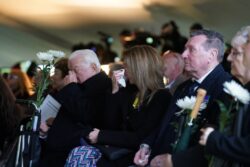Former RAF serviceman Ed McGrath and a veteran’s granddaughter Laura Morris wipe away tears at the National Memorial Arboretum in Alrewas, Staffordshire, today (Picture: PA)
Thousands of veterans who took part in the UK’s nuclear test programme will receive a medal for their service seven decades on.
The new award was announced by the government as veterans and politicians gathered to mark the 70th anniversary of the country’s first successful atomic test today – dubbed the ‘plutonium jubilee’.
Around 22,000 veterans, scientists and civilians from the UK, Australia, New Zealand, Fiji and Kiribati will be eligible for the Nuclear Test Medal.
Only around 1,500 of them are believed to still be alive, but families and relatives will be able to apply for a posthumous award.
Prime minister Rishi Sunak said: ‘I am incredibly proud that we are able to mark the service and dedication of our nuclear test veterans with this new medal.
‘Their commitment and service has preserved peace for the past 70 years, and it is only right their contribution to our safety, freedom and way of life is appropriately recognised with this honour.
‘This medal is an enduring symbol of our country’s gratitude to each and every person who played a part in this effort and their loved ones who supported them.’
Groups including the Labrats International charity have campaigned for survivors to be given official recognition for many years.
Nuclear test veterans and their relatives wearing their ‘missing medals’ – which should soon be replaced with real ones (Picture: atomiclabrats / Instagram)
A plaque commemorates nuclear test veterans at the National Memorial Arboretum (Picture: PA)
Prime minister Rishi Sunak spoke at the arboretum to veterans and their relatives (Picture: PA)
Veterans’ affairs minister Johnny Mercer said: ‘This medal honours those who served far from home, at a crucial time in our nation’s history.
‘To this day the nuclear deterrent remains the cornerstone of our defence, and that is only because of the service and contribution of the brilliant veterans and civilian personnel.’
Defence secretary Ben Wallace also thanked veterans for their ‘invaluable contribution’ to national security.
Many veterans and their relatives were seen wiping away tears at the commemoration in the National Memorial Arboretum in Alrewas, Staffordshire, today.
The first awards will be made next year and follow in the footsteps of Fiji, New Zealand, the US and France, which have previously given medals to those involved in nuclear tests.
Two years ago RAF serviceman Gordon Coggon told Metro.co.uk about his experience of witnessing a nuclear test.
Prime minister Rishi Sunak and minister for veterans’ affairs, Johnny Mercer, pictured at the commemoration today (Picture: PA)
Nuclear test veterans protested outside the Ministry of Defence in London earlier this month (Picture: EPA)
What were the UK’s nuclear tests?
The US became the first nation to develop nuclear weapons during the Second World War, and the then-Soviet Union tested its first nuclear weapon in 1949.
The UK became the world’s third nuclear power on October 3, 1952, after it detonated a plutonium bomb on the Montebello Islands in Australia – known as Operation Hurricane.
Hundreds more tests were carried out until 1967, including at Emu Field and Maralinga in Australia, Christmas and Malden Islands in Kiribati, and Nevada in the US.
The tests involved experimenting with plutonium and hydrogen bombs to determine their strength and see how effective they were.
Probably the most notorious bomb was Operation Grapple Y in 1958, which was more than 100 times more powerful than the explosions at Hiroshima and Nagasaki.
He recalled: ‘I’d seen the shadow of the bones in my hand whilst my eyes were shut and my head tucked into my hands. I could literally feel the Gamma ray travel through my body.
‘At that moment I thought I was being burnt alive.’
He had witnessed Grapple X, one of Britain’s largest nuclear weapons tests, just 20 miles from ground zero.
The men were often exposed to high levels of radiation but issued with little, if any, protective equipment.
After the tests, they were ordered to keep quiet about the horrors they had witnessed.
Many went on to suffer ill health, with an increased rate of cancers, infertility and birth defects observed in veterans and their descendants.
But the Ministry of Defence has previously disputed the link between the nuclear tests and ill health, claiming several studies found no association.
In December 2020, the Government’s military sub-committee reportedly advised against awarding medals in December 2020 because survivors ‘had not faced adequate risk’.
The government is also investing £450,000 into oral history projects which will build an accessible digital archive of testimonies.
Get in touch with our news team by emailing us at [email protected].
For more stories like this, check our news page.
The new award was announced on the 70th anniversary of the country’s first successful atomic test today.




